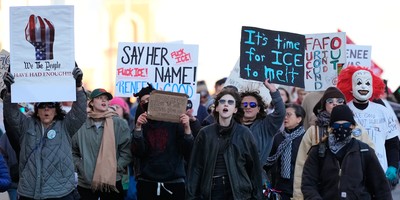Two cases likely to be decided this month by the Supreme Court -- one of them an appeal in a Connecticut case decided by a panel including Supreme Court nominee Judge Sonia Sotomayor -- could result in significant changes in our civil rights laws.
One case involves a utility district in Texas that is challenging the Voting Rights Act requirement that any changes in its election procedures receive approval -- "preclearance" is the technical term -- from the Justice Department. The other involves the city of New Haven's refusal to promote several white firefighters and one Hispanic after they passed a promotion test but no black firefighters did.

The betting among Supreme Court analysts is that a majority of the court will rule for the Texas utility district and the New Haven firefighters. Defenders of the status quo will view this as a dangerous undermining of equal rights. Others -- include me on the list -- will see it as a step forward for equal rights and for Martin Luther King's entreaty that Americans be judged on the content of their character and not the color of their skin. That's because in both cases, the legal rule the court seems likely to overturn is no longer relevant to life as it is in America today.
Take the Voting Rights Act. First enacted in 1965, it required appointment of federal registrars and federal approval of any changes in election procedures in several states and local jurisdictions where less than half of eligible voters had voted in 1964. This was a drastic intervention by the federal government -- and thoroughly justified at the time.
Officials in Southern states were using subterfuge and intimidation to prevent blacks from registering and voting. Local whites threatened violence to any black who tried to vote, and in Mississippi three civil rights workers were murdered in 1964. The Voting Rights Act got blacks on the rolls and to the polls, and very quickly, too. It was the most effective civil rights law in American history.
Recommended
Is it still needed today? Yes, to address the very rare cases of voter intimidation, as in the 2007 case against a black political boss who was blocking whites from voting in Noxubee County, Miss. But are the preclearance provisions still needed in states that had low voter turnout 45 years ago? Not really, it seems -- the very few that are questioned by the Justice Department suggests that such problems are no greater in those states than anywhere else, and that they can probably be addressed through the political process.
The Texas utility district appealing to the Supreme Court has no history of racial discrimination; it was created long after 1965. If preclearance is important, let Congress apply it to all the states. If it's not, why burden states and localities for misconduct that almost entirely ceased soon after 1965?
The New Haven firefighters were denied their promotions because, the city of New Haven claims, it feared that the promotion tests would be challenged under a 1971 Supreme Court decision raising a presumption against tests that have "disparate impact" on blacks and whites. That presumption made empirical sense in 1971, when many employers used any stratagem they could to avoid hiring and promoting blacks. But those days are mostly gone, too. The city of New Haven wants to promote blacks. That's why it denied the white and Hispanic firefighters the promotions they had earned on a test the city paid thousands of dollars to develop as fair and racially unbiased.
Similarly, most employers these days want to hire and promote blacks, both to prevent bad publicity and to avoid lawsuits -- and because the vast majority of Americans today want to be fair. But fairness, as the New Haven case shows, inevitably produces disparate impacts.
Talents and abilities are not distributed evenly among people whom we insist on categorizing as white, black, Hispanic, and Asian and Pacific Islander. The Supreme Court's 1971 disparate impact standard, like the Voting Right Act's 1964 standard for voter turnout, was fashioned at a time when racial discrimination was exceedingly common and was pursued cunningly so as to escape legal detection.
That is not the America we live in today. It is not the America that elected Barack Obama president. Retaining these standards today does not prevent racial discrimination, it promotes it -- as the New Haven firefighters can attest.
























Join the conversation as a VIP Member